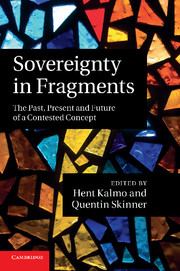Book contents
- Frontmatter
- Contents
- Notes on contributors
- Acknowledgements
- Introduction: a concept in fragments
- 1 The sovereign state: a genealogy
- 2 The apparition of sovereignty
- 3 The Westphalian myth and the idea of external sovereignty
- 4 Double binds: sovereignty and the just war tradition
- 5 The durability of organized hypocrisy
- 6 A matter of fact? The many faces of sovereignty
- 7 The survival of sovereignty
- 8 Sovereignty and after
- 9 Prolegomena to the post-sovereign Rechtsstaat
- 10 Sovereignty beyond the state
- 11 Sovereignty between government, exception and governance
- 12 Conclusion: vocabularies of sovereignty – powers of a paradox
- Bibliography
- Index
12 - Conclusion: vocabularies of sovereignty – powers of a paradox
Published online by Cambridge University Press: 04 February 2011
- Frontmatter
- Contents
- Notes on contributors
- Acknowledgements
- Introduction: a concept in fragments
- 1 The sovereign state: a genealogy
- 2 The apparition of sovereignty
- 3 The Westphalian myth and the idea of external sovereignty
- 4 Double binds: sovereignty and the just war tradition
- 5 The durability of organized hypocrisy
- 6 A matter of fact? The many faces of sovereignty
- 7 The survival of sovereignty
- 8 Sovereignty and after
- 9 Prolegomena to the post-sovereign Rechtsstaat
- 10 Sovereignty beyond the state
- 11 Sovereignty between government, exception and governance
- 12 Conclusion: vocabularies of sovereignty – powers of a paradox
- Bibliography
- Index
Summary
Having read the preceding chapters, one will have no problem in concluding that the time of sovereignty is hardly over and that, whatever changes our political or juridical languages may undergo in the foreseeable future, ‘sovereignty’ will remain part of them. Whether this be in terms of naming a good we desire, attacking the inadequacy of some of its institutional realizations, or in other ways trying to make sense of our experience, ‘sovereignty’ will continue to structure and direct our legal and political imagination, hovering, as many of the chapters in this volume highlight, obscurely in the frontier between the two. It is, as Kalmo and Lipping write, precisely this ‘limit’ aspect of sovereignty that intrigues us, the way it points to the insufficiency of ‘law’ or ‘politics’ if considered in their own terms as autonomous languages or self-regulating systems of thought. My sense is that sovereignty's continued attraction – despite the many ways in which we have learned to be critical of its manifestations – depends precisely on the way it points across that boundary into some ‘fundamental’ aspect of the world that we are vaguely aware of but is never quite captured by the normal vocabularies we use to address our political or legal experience. The word ‘transcendental’ might not be out of place here, if only to remember Hans Kelsen's brilliant attempts to resolve the sovereignty puzzle at a time of incipient legal and political collapse.
- Type
- Chapter
- Information
- Sovereignty in FragmentsThe Past, Present and Future of a Contested Concept, pp. 222 - 242Publisher: Cambridge University PressPrint publication year: 2010
- 9
- Cited by



